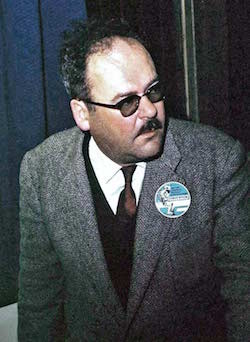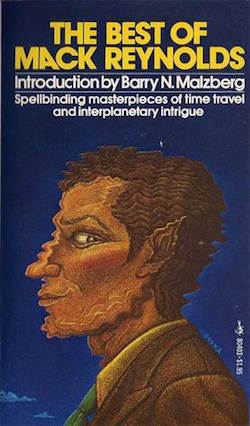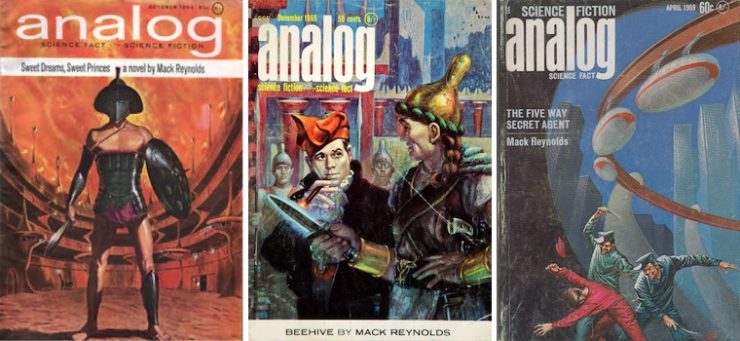In this bi-weekly series reviewing classic science fiction and fantasy books, Alan Brown looks at the front lines and frontiers of the field; books about soldiers and spacers, scientists and engineers, explorers and adventurers. Stories full of what Shakespeare used to refer to as “alarums and excursions”: battles, chases, clashes, and the stuff of excitement.
When we think about the science in science fiction, we generally think of the hard sciences: physics, astronomy, chemistry, etc. Yet there are other sciences rooted in human behavior, sometimes sneeringly referred to as “softer” sciences, including economics, sociology and political science. One of the authors who specialized in incorporating these other sciences into his fiction in a way that was anything but soft was Mack Reynolds, one of the most prolific contributors to Analog in the 1960s. He would often punctuate a discussion of communist five-year plans or minimum basic incomes with a gun battle, or a romantic moment, or a chase scene. And while some of the settings in his work now seem dated, the issues he grapples with are still with us today, and worthy of our attention.
When I started reading SF in Analog in the mid-1960s, it seemed like Mack Reynolds’s byline appeared in at least every other issue. He was soon one of the authors I looked for. In those days, I liked his stories for the adventure and excitement. I was drawn to characters like the mercenary Joe Mauser, and to the spies skulking around in the shadows of exotic foreign countries. Reading his work now, however, I come to it with a whole different perspective. Having completed college work in economics, law, political science, trade and international relations, I have a much greater appreciation for the issues that made up the backdrop of his stories: the clash of governmental systems, and economic conflict of all types. I also have more of an appreciation for his rather cynical view of the human condition, and am not as troubled by the fact that many of his tales lack happy endings.
I couldn’t find any Reynolds books readily available in my basement, so I ordered The Best of Mack Reynolds online—and it proved to be a delightful read. I had encountered less than half of the stories back when they first appeared, so it gave me an opportunity to visit an old favorite author in new settings. I’ve always felt that Reynolds did his best work at shorter lengths, and reading this collection reinforced that opinion. In fact, the only complaint I have about the collection is the cover, a nondescript painting of a pointy-eared man in profile that is singularly disconnected with the contents.
Following the fall of communism in Central and Eastern Europe, some might say that Reynolds’ work is obsolete, but despite the changes to the economic systems, there is much from the Soviet system that remains the same in Russia today. Certainly, many of the weaknesses of the U.S. economic system have not been mitigated in recent years. And the days of great world powers clashing and competing through means other than war seem to be returning, so Reynolds’ tales of espionage still ring true.
About the Author
 Dallas McCord Reynolds (1917-1983), who wrote primarily as Mack Reynolds, had a career that spanned from 1950 to his death in the early 1980s, and was one of the most prolific contributors to science fiction magazines in the 1960s. He was a favorite of editor John Campbell at Analog, of Fred Pohl during his time as editor of Galaxy and If magazines, and a frequent contributor to various other magazines as well.
Dallas McCord Reynolds (1917-1983), who wrote primarily as Mack Reynolds, had a career that spanned from 1950 to his death in the early 1980s, and was one of the most prolific contributors to science fiction magazines in the 1960s. He was a favorite of editor John Campbell at Analog, of Fred Pohl during his time as editor of Galaxy and If magazines, and a frequent contributor to various other magazines as well.
Reynolds was the son of a prominent member of the Socialist Labor Party, and spent years working with his father in what might be referred to as the “family business.” He worked in newspapers, as well as for for IBM in a shipyard. During World War II, he joined the Army Transportation Corps as a marine officer, and served as a navigator on freighters in the Pacific Theater. Upon his return, he set his sights on becoming a professional writer, and once he settled on writing what he loved—science fiction—he began to find success. His non-fiction writing, which did not hew to a strict socialist ideology, eventually aroused the ire of members of the Socialist Labor Party, and he quit the organization in late 1950s. He lived as an expatriate for many years, and his world travels helped him to set his tales quite realistically in foreign lands.
His work was deeply influenced by his political views, which did not follow a strictly doctrinal approach. Although he was no fan of capitalist systems and their excesses, he was also pessimistic that socialism could prove a viable alternative. He found communism especially problematic, specifically as it was practiced in the Soviet Union. He was fond of stories with a twist or surprise ending, and his humor was often dark. His protagonists rarely find happy endings, and frequently end up dead.
While his work was very popular with the readers of magazines in which his stories appeared, Reynolds garnered only one Hugo nomination and two Nebula nominations during his career, with no awards won.
Notably, Reynolds wrote Mission to Horatius, the first original novel based on the Star Trek TV series, a novel which might be considered the start of an entire sub-genre of science fiction.
In the 1970s, Reynolds found it harder to place his stories in magazines, and some of his work was caught up in the financial problems plaguing Ace Books at the time. Just before his untimely death in 1983, he signed with Tor Books, and most of the books involved in that contract appeared posthumously, with some being completed by other authors, such as Dean Ing and Michael A. Banks.
The Worlds of Mack Reynolds
Mack Reynolds wrote much of his work at the height of the Cold War, and his future anticipated that great power stalemate between communists and capitalists continuing into the future. There was much he predicted that is close to what we see today: unification of a Common Europe, worldwide computer networks, an electronic credit system largely replacing cash, and a population that spends large amounts of time watching big-screen televisions. While we haven’t yet seen widespread unemployment due to automation, we certainly seem to be heading in that direction. And while drug use is widespread, we haven’t reached the point where it is openly encouraged by the government. The Cold War stalemate appeared broken for a while, but the games of the great powers seem to be returning to the fore, with old alliances fraying and the U.S., Russia, and China contending for power in a multipolar world.
Not all of Reynolds’ stories shared the same future history, but many of them involved recurring characters and backgrounds. These include:
- The Joe Mauser stories, which follow a mercenary in a future United States, where society has devolved into a strict caste system and most citizens do not work, living off a guaranteed minimum income and being entertained by drugs and television programs. Combat is used to settle disputes between corporations, with weapons being limited by international treaty to those that existed before 1900. In addition to the socio-economic extrapolation, these were solid military and espionage adventure tales.
- The Homer Crawford tales, where a black American agent of the “Reunited Nations” works to improve the political and economic situation in Africa. These stories were lauded for the positive portrayal of black protagonists, but also criticized for Reynolds’ hubris as an outsider proposing solutions for African problems.
- The United Planets series, which followed the interplanetary adventures of the secret agents of an organization called Section G as they dealt with socioeconomic issues.
- The “2000” series, where Reynolds boldly looked forward to what the world might be like at the turn of the century, despite the risk of stories set in the near future quickly being overtaken by real-life events.
- The LaGrange series, written later in Reynolds’ career, which involved espionage stories set in utopian near-Earth space colonies.
What all these settings shared was a detailed view of government and economic systems and a cynical focus on the fallibility of human social structures. Reynolds was able to shine a light on many problems that we still grapple with today.
The Best of Mack Reynolds
 Unlike some “Best of” compilations, this collection’s stories were personally selected by the author, and represent his own opinions of his work. The selections reveal that Reynolds, who I had always thought of as a writer of action-packed adventures, is actually far more interested in ideas, and in stories that involve a clever twist. The book also contains introductions that provide some insights to his creative process.
Unlike some “Best of” compilations, this collection’s stories were personally selected by the author, and represent his own opinions of his work. The selections reveal that Reynolds, who I had always thought of as a writer of action-packed adventures, is actually far more interested in ideas, and in stories that involve a clever twist. The book also contains introductions that provide some insights to his creative process.
There are many extremely short short stories in the collection, which, because they depend on a surprise ending, I won’t say much about. These include “Down the River” (Reynolds’ first SF sale, an alien arrival story), “Come In, Spaceport” (a space rescue tale), “The Business, As Usual” (a time travel con game story), “Burnt Toast” and “Your Soul Comes C.O.D.” (deal-with-the-devil stories that go in different directions), “Good Indian” (a bureaucratic satire), “No Return from Elba” (a dark political satire), “Earthlings, Go Home” (a travel puff piece about Mars), “Albatross” (first contact goes awry), “Utopian” (attaining utopia may have risks), “Prone” (bad luck as a military weapon), and “Second Advent” (the president gets an unexpected visitor).
The first story that I’ll give separate mention to, here, “Compounded Interest,” is one of Reynolds’ most popular tales, a darkly humorous tale of a time traveler who amasses a fortune by making clever investments at regular intervals in the past. Like many of the best time travel tales, this one folds back cleverly upon itself.
“Freedom” is the first story in the collection that I thought of as a typical Reynolds work, probably because it is the first in the collection that appeared in Analog, where I first encountered the author. A Soviet agent, looking to root out subversion against the State, infiltrates the ranks of the revolutionaries, and as he considers the excesses of the communist system, finds himself becoming sympathetic to their aims.
“Revolution” is another tale of Cold War-style espionage. The U.S., desperate because the Soviets are beginning to win the economic battle between the two powers, sends their best agent to overthrow the government. But as he works, and falls in love with a beautiful revolutionary, the agent begins to wonder what kind of rival a Russia unfettered by bureaucracy could become. The tale shows Reynolds’ deep knowledge of, and deep pessimism toward, political systems in both the U.S. and Russia. The thought that the five-year plans of the Soviet Union could have ever succeeded is laughable in hindsight, but the story is a good one, well-crafted and absorbing.
“Pacifist” is the tale of a man who works for an organization willing to commit violence to prevent the greater evil of an atomic war, and is one of the most thought-provoking stories in the volume. The question of whether the ends justify the means hangs heavily over the narrative.
“Subversive” is a clever tale that mocks our capitalist system, taking some of its excesses and reducing them to absurdity, as a young soap salesman works to eliminate the costs of packaging, advertising, and distribution, and runs afoul of an organization that wants to preserve the status quo at all costs.
“The Enemy Within” is another first contact story, where the scout dies an accidental death and his automated ship must deal with the Earth’s inhabitants. When the first visitor to the ship is a very young boy, followed closely by his angry mother, the ship makes some serious mistakes in analyzing the situation. All is eventually set right in a most unexpected way.
“Survivor” is another of the most thought-provoking stories in the book, outlining the carnage that many thought would ensue in the event of a nuclear war. Some of the survivors, however, have a unique and less violent response to the situation, which sounds improbable at first, but makes you think about other possibilities.
“Fad” is the story of a couple of old con men who attempt to recreate the Davy Crockett fad of the 1950s with a manufactured fad that will allow them to get ahead of the demand for related consumer products. But their choice of the idealistic martyr Joan of Arc, and their dismissal of women’s viewpoints, ends up with the two being hoisted by their own petard.
“Spaceman on a Spree” is another darkly humorous tale, which I suspect draws on Reynolds’ own experience as a mariner. A government official attempts to manipulate a space explorer into continuing his career, with disastrous results.
“The Adventure of the Extraterrestrial” is a delightful and cleverly humorous Sherlock Holmes pastiche in which the investigator is hired to determine whether aliens have infiltrated our society. Doctor Watson, often one step behind Holmes, finds himself baffled by the whole affair.
Final Thoughts
Like many authors of his time, there is a selection of Reynolds’ work that is now out of copyright, and available on the internet (you can find some of it here). Based on my experience with his fiction, while many of his tales were later expanded to novel length, his stories are best experienced in their shorter, original forms.
It was a pleasure for me to revisit Mack Reynolds’ work for this review, and I have gained a new appreciation for the material. While some of his work must now be considered “alternate history,” his stories still make us think about issues relevant to our world today. Like many authors of his time, his prose is snappy and direct, without a lot of padding or fluff. And he ranks among the best at portraying action, adventure, and the world of espionage.
And now the floor is yours. What are your favorite works of Mack Reynolds? Do you think they still have relevance today?
Alan Brown has been a science fiction fan for over five decades, especially fiction that deals with science, military matters, exploration and adventure.











